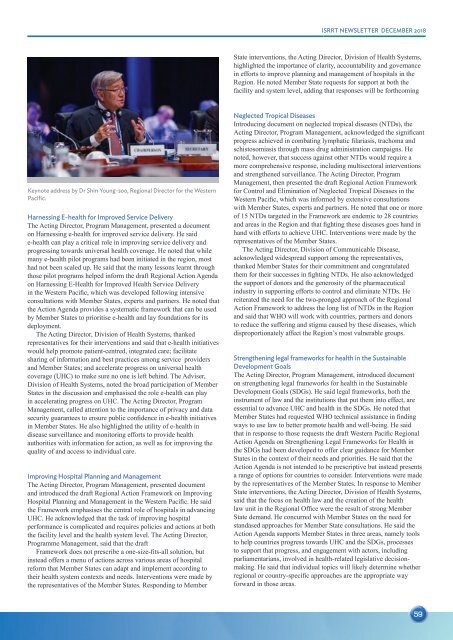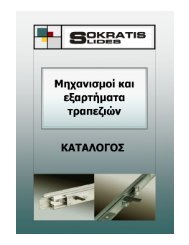ISRRT_DEC2018_WEB
You also want an ePaper? Increase the reach of your titles
YUMPU automatically turns print PDFs into web optimized ePapers that Google loves.
<strong>ISRRT</strong> NEWSLETTER DECEMBER 2018<br />
State interventions, the Acting Director, Division of Health Systems,<br />
highlighted the importance of clarity, accountability and governance<br />
in efforts to improve planning and management of hospitals in the<br />
Region. He noted Member State requests for support at both the<br />
facility and system level, adding that responses will be forthcoming<br />
Keynote address by Dr Shin Young-soo, Regional Director for the Western<br />
Pacific.<br />
Harnessing E-health for Improved Service Delivery<br />
The Acting Director, Program Management, presented a document<br />
on Harnessing e-health for improved service delivery. He said<br />
e-health can play a critical role in improving service delivery and<br />
progressing towards universal health coverage. He noted that while<br />
many e-health pilot programs had been initiated in the region, most<br />
had not been scaled up. He said that the many lessons learnt through<br />
those pilot programs helped inform the draft Regional Action Agenda<br />
on Harnessing E-Health for Improved Health Service Delivery<br />
in the Western Pacific, which was developed following intensive<br />
consultations with Member States, experts and partners. He noted that<br />
the Action Agenda provides a systematic framework that can be used<br />
by Member States to prioritise e-health and lay foundations for its<br />
deployment.<br />
The Acting Director, Division of Health Systems, thanked<br />
representatives for their interventions and said that e-health initiatives<br />
would help promote patient-centred, integrated care; facilitate<br />
sharing of information and best practices among service providers<br />
and Member States; and accelerate progress on universal health<br />
coverage (UHC) to make sure no one is left behind. The Adviser,<br />
Division of Health Systems, noted the broad participation of Member<br />
States in the discussion and emphasised the role e-health can play<br />
in accelerating progress on UHC. The Acting Director, Program<br />
Management, called attention to the importance of privacy and data<br />
security guarantees to ensure public confidence in e-health initiatives<br />
in Member States. He also highlighted the utility of e-health in<br />
disease surveillance and monitoring efforts to provide health<br />
authorities with information for action, as well as for improving the<br />
quality of and access to individual care.<br />
Improving Hospital Planning and Management<br />
The Acting Director, Program Management, presented document<br />
and introduced the draft Regional Action Framework on Improving<br />
Hospital Planning and Management in the Western Pacific. He said<br />
the Framework emphasises the central role of hospitals in advancing<br />
UHC. He acknowledged that the task of improving hospital<br />
performance is complicated and requires policies and actions at both<br />
the facility level and the health system level. The Acting Director,<br />
Programme Management, said that the draft<br />
Framework does not prescribe a one-size-fits-all solution, but<br />
instead offers a menu of actions across various areas of hospital<br />
reform that Member States can adapt and implement according to<br />
their health system contexts and needs. Interventions were made by<br />
the representatives of the Member States. Responding to Member<br />
Neglected Tropical Diseases<br />
Introducing document on neglected tropical diseases (NTDs), the<br />
Acting Director, Program Management, acknowledged the significant<br />
progress achieved in combating lymphatic filariasis, trachoma and<br />
schistosomiasis through mass drug administration campaigns. He<br />
noted, however, that success against other NTDs would require a<br />
more comprehensive response, including multisectoral interventions<br />
and strengthened surveillance. The Acting Director, Program<br />
Management, then presented the draft Regional Action Framework<br />
for Control and Elimination of Neglected Tropical Diseases in the<br />
Western Pacific, which was informed by extensive consultations<br />
with Member States, experts and partners. He noted that one or more<br />
of 15 NTDs targeted in the Framework are endemic to 28 countries<br />
and areas in the Region and that fighting these diseases goes hand in<br />
hand with efforts to achieve UHC. Interventions were made by the<br />
representatives of the Member States.<br />
The Acting Director, Division of Communicable Disease,<br />
acknowledged widespread support among the representatives,<br />
thanked Member States for their commitment and congratulated<br />
them for their successes in fighting NTDs. He also acknowledged<br />
the support of donors and the generosity of the pharmaceutical<br />
industry in supporting efforts to control and eliminate NTDs. He<br />
reiterated the need for the two-pronged approach of the Regional<br />
Action Framework to address the long list of NTDs in the Region<br />
and said that WHO will work with countries, partners and donors<br />
to reduce the suffering and stigma caused by these diseases, which<br />
disproportionately affect the Region’s most vulnerable groups.<br />
Strengthening legal frameworks for health in the Sustainable<br />
Development Goals<br />
The Acting Director, Program Management, introduced document<br />
on strengthening legal frameworks for health in the Sustainable<br />
Development Goals (SDGs). He said legal frameworks, both the<br />
instrument of law and the institutions that put them into effect, are<br />
essential to advance UHC and health in the SDGs. He noted that<br />
Member States had requested WHO technical assistance in finding<br />
ways to use law to better promote health and well-being. He said<br />
that in response to those requests the draft Western Pacific Regional<br />
Action Agenda on Strengthening Legal Frameworks for Health in<br />
the SDGs had been developed to offer clear guidance for Member<br />
States in the context of their needs and priorities. He said that the<br />
Action Agenda is not intended to be prescriptive but instead presents<br />
a range of options for countries to consider. Interventions were made<br />
by the representatives of the Member States. In response to Member<br />
State interventions, the Acting Director, Division of Health Systems,<br />
said that the focus on health law and the creation of the health<br />
law unit in the Regional Office were the result of strong Member<br />
State demand. He concurred with Member States on the need for<br />
standased approaches for Member State consultations. He said the<br />
Action Agenda supports Member States in three areas, namely tools<br />
to help countries progress towards UHC and the SDGs, processes<br />
to support that progress, and engagement with actors, including<br />
parliamentarians, involved in health-related legislative decisionmaking.<br />
He said that individual topics will likely determine whether<br />
regional or country-specific approaches are the appropriate way<br />
forward in those areas.<br />
59

















